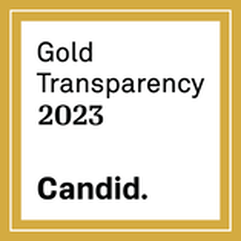|
This piece is an expressive autobiographical account from one of our blog's newest volunteer writers.
Trigger Warning: The following content discusses frankly the reality of living through abuse and sexual assault, and the realities of PTSD. To proceed with reading the piece, click the link below saying "Read More".
0 Comments
Looking for something new to read? The Center on 18th St. has a library full of books on LGBTQ+ subjects that can be checked out for up to two weeks. Everyone is welcome to check out up to two books at a time, or you can come by to The Center during regular hours and read in one of the comfy chairs and couches available. To see the catalog of what's available, check out the library's online catalog. a few examples of books from our shelves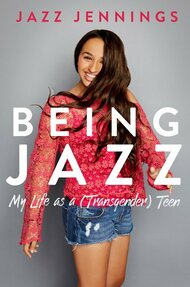 Being Jazz: My Life as a (Transgender) Teen By Jazz Jennings Jazz Jennings is one of the youngest and most prominent voices in the national discussion about gender identity. At the age of five, Jazz transitioned to life as a girl, with the support of her parents. A year later, her parents allowed her to share her incredible journey in her first Barbara Walters interview, aired at a time when the public was much less knowledgeable or accepting of the transgender community. This groundbreaking interview was followed over the years by other high-profile interviews, a documentary, the launch of her YouTube channel, a picture book, and her own reality TV series—I Am Jazz—making her one of the most recognizable activists for transgender teens, children, and adults. In her remarkable memoir, Jazz reflects on these very public experiences and how they have helped shape the mainstream attitude toward the transgender community. But it hasn’t all been easy. Jazz has faced many challenges, bullying, discrimination, and rejection, yet she perseveres as she educates others about her life as a transgender teen. Through it all, her family has been beside her on this journey, standing together against those who don't understand the true meaning of tolerance and unconditional love. Now Jazz must learn to navigate the physical, social, and emotional upheavals of adolescence—particularly high school—complicated by the unique challenges of being a transgender teen. Making the journey from girl to woman is never easy—especially when you began your life in a boy’s body. 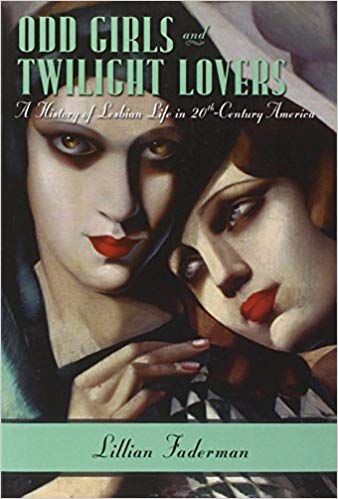 Odd Girls and Twilight Lovers: A History of Lesbian Life in Twentieth-Century America by Lillian Faderman As Lillian Faderman writes, there are "no constants with regard to lesbianism," except that lesbians prefer women. In this groundbreaking book, she reclaims the history of lesbian life in twentieth-century America, tracing the evolution of lesbian identity and subcultures from early networks to more recent diverse lifestyles. She draws from journals, unpublished manuscripts, songs, media accounts, novels, medical literature, pop culture artifacts, and oral histories by lesbians of all ages and backgrounds, uncovering a narrative of uncommon depth and originality. 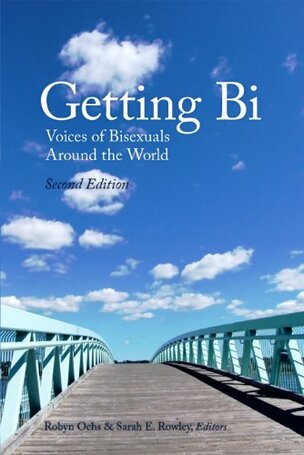 Getting Bi: Voices of Bisexuals Around the World by Robyn Ochs, Sarah E. Rowley (Editor) Getting Bi: Voices of Bisexuals Around the World, Second Edition, edited by Robyn Ochs and Sarah Rowley, is the broadest single collection of bisexual literature available today. Getting Bi collects 220 essays from around the world that explore bisexual identity. Topics include coming out, relationships, politics, community, and more. The book also addresses the intersection of bisexuality with race, class, ethnicity, gender identity, disability and national identity. Authors from 42 countries discuss bisexuality from personal perspectives and their own cultural contexts providing insight into societal views on bisexuality from countries ranging from Colombia to China. How To Be An Ally: Learning the difference between gender identity and sexual orientation (part 1)4/14/2019 One of the most important parts of being an ally to the LGBTQ+ community is understanding. Even within our own community, to be an ally to each other, it's important that we make an effort to understand the nuances of people's identities, so that we don't make assumptions that could be hurtful or even harmful. And in order to understand someone, we have to listen to them.
I know that when I came out to my friends and family, the most important thing to me was being heard. I wasn't waiting for them to say the perfect thing or judging them based on using the wrong word. What I was looking for was general acceptance, not just uneasy tolerance. I was looking for a chance to talk about my experiences without being questioned or told I was wrong. The simple chance to speak my story without feeling I had to defend it was priceless to me. At the time when I first came out, I hadn't heard a lot of the differences between sexual orientation and gender identity explained. I hadn't studied any of this stuff in school or on my own. I was only a little bit familiar with the definitions of words like "cisgender" and "transgender". Back in 2009, I had only very recently heard someone use the word "pansexual" to describe themselves. (The auto-correct spelling program for this website still doesn't recognize the words "pansexual" or "cisgender" yet. My post is full of red squiggly underlines.) To this day I am still learning. Thankfully, there are a lot more resources online and in-person nowadays that make it much easier to do. In this post, I'm going to share some basic definitions and answers to questions that I've learned over the past few years. What is gender identity? Gender identity is something everyone has - whether you are LGBTQ+ or not. Anyone reading this has their own ideas of what gender means to them, and whether the gender people perceive them as having matches their internal identity or not. What is sexual orientation? Sexual orientation describes who you are attracted to. Straight people and gay people alike have sexual orientations. Some words describing sexual orientation are: heterosexual, homosexual, bisexual, asexual and pansexual. What is the difference between gender identity and sexual orientation? Sexual orientation refers to who you are attracted to, not your gender identity. Any gender identity can correspond to a range of different sexual orientations. However, the word you use to describe your sexuality often depends on your gender identity. For example, if you identify as a woman, and you are only attracted to others who identify as women, but not to those who identify as men, then most likely you would use the term "lesbian" to describe your sexual orientation. Your gender identity may match the one other people see you as - your parents, doctors and so on - and fit with the way you were treated as you were brought up. Or your gender identity may be at odds with how other people perceive you. You may have been brought up being treated like you are one gender identity, when in reality you don't feel like that identity at all. Here are some common definitions, with an (S) if they refer to sexual orientation and a (G) if they refer to a gender identity: Lesbian (S): A woman who is attracted to other women exclusively. Gay man (S): A man who is attracted to other men exclusively. Bisexual (S): Someone who is attracted to people of their own gender as well as those of other genders. Gay (S): A catch-all term for people who are attracted to the person of the same gender they are. Cisgender (G): [Pronounced "sis-gender"; like the "sis" sound in "sister"] A person who identifies with the gender they were assigned at birth (almost always based on how doctors identified their biological sex). Transgender (G): A person who does not identify with the gender they were assigned at birth. If you grew up in the 1970's, 1980's and 1990's, you probably heard these some or all of these terms before and are familiar with their definitions. However, over the past 20 or so years, there has been a lot of progress made in understanding and talking about people who do not fit these traditional definitions. Our vocabularies have expanded wonderfully. Before we talk about the newer terms you may have heard (we'll save that for the next post), let's go over some of the core concepts you'll need to know in order to understand them. Sex: A set of characteristics associated with reproduction and biology that generally assign individuals into binary categories of either “male” and “female.” Typically this is done at birth by the doctors in the hospital. Most of us are brought up as our assigned sex, with the assumption that our assigned sex matches our gender identity. For many people, this is fine. For others, whose gender identity does not match their assigned sex, the experience can be horribly confusing and painful. Intersex: Intersex is a general term used for a variety of conditions in which a person is born with a reproductive or sexual anatomy that doesn't seem to fit the typical definitions of female or male. It can be hard to pinpoint how often this happens in our general population, depending on what exact definition you use to determine who is and isn't considered to have an intersex condition, but in general the reported numbers from hospitals are around at least 1 in 2,000 babies born, probably more accurately 1 in 1,000. People with intersex conditions may identify as either cisgender or transgender. Just because a person is born with an intersex condition does not mean they consider themselves transgender. Gender Identity: Our inward experience of our gender. This does not depend on other people but is our own perception of who we are. You do not have to act a certain way, dress a certain way or have surgery to confirm your gender identity. Everyone has a right to their own identity and self-concept. Some people see the world as having two binary genders, and so they will only identify as one or the other: a man or a woman. Others see the world as having a spectrum of genders, and may place themselves somewhere between two binaries of man and woman: as closer to one than the other; as equally both; or as neither. Finally, some people reject the concept of fixed genders altogether, and don't believe in a gender binary or in a gender spectrum. The most important thing to do when talking to someone about their gender identity is to listen. We all have a right to think about the world and ourselves in our own unique way. What we should never do is tell someone else their self-concept is wrong, just as we should never entertain invalidation from other people. Gender Expression or Presentation: Our outward appearance as it affects how people think about our gender identity. This includes the clothing we wear, the words we use, the type of voice we have, our mannerisms, our posture, our haircuts, shaving or not shaving body hair, wearing or not wearing make up - there are many ways in which we present who we are to the world. All people have a gender expression, whether they are cisgender or transgender, straight or gay. We are all allowed to have a gender expression that does not match our gender identity. For many reasons, but particularly because of discrimination against gender nonconforming and transgender individuals, people may choose to present their gender as one way to the public, yet hold a very different identity inside. It is not lying or dishonest to express your gender one way for the public, while maintaining your own private gender identity. Sometimes people may present their gender one way at work, for example, yet express themselves a different way among their friends or within a safe community. Everyone has a right to their gender identity regardless of whether it matches their gender presentation sometimes, all of the time or none of the time. Gender Nonconforming: A broad term for people who don't fit social expectations of their gender. This very much depends on the society they were raised in and the corresponding social norms. People can be gender nonconforming through their clothing, attitudes, hobbies and any other area where their society divides things along gender lines. Being gender nonconforming does not mean a person is gay or transgender. A heterosexual cisgender woman can be gender nonconforming by wearing clothing usually worn by men in her culture. Similarly, a heterosexual cisgender man may enjoy hobbies that his society usually presumes are "for women". This does not make him transgender or gay. He is simply a gender nonconforming person. Not conforming to gender stereotypes does not change one's sexual orientation or gender identity in the slightest. I hope that was helpful! In the next part of this series, I'll go over what some of the newer words and terms mean, and talk more about what my own identity means to me. I had spent a really long time thinking I’m an individual, so different than the rest until I created an online dating account and saw that eight other people put all the same things on their profiles about how they love horror films and like to go on adventures. You might think that’s good because I have things in common with other women, but I think we all would like to stand out of the crowd a little bit, especially in the dating game. The truth is we all are unique and important but sometimes it gets hard to see that. People might not treat you with respect, they might not understand you, judge you, etc. The key to being above that is to love yourself. Society has a way of making you feel less important than you actually are. One of the best lessons I’ve learned on my little “adventure” of life was the importance of finding yourself. It is essential not only for self-respect but happiness. I would even say that its essential for life. Before I realized I was a lesbian, life was overwhelmingly confusing and stressful. I spent most of my teens hating myself and thinking I was a freak because I was bullied pretty bad in middle school and I had a crush on this girl, I saw as superior to me, and I was in denial about for a year. That was my train of thought and I felt like I was a burden on my family and friends. I cringe now thinking about this but the truth was that I didn’t understand myself. I decided to believe all the horrible things people thought of me instead of having opinions of my own. I decided to see myself through the eyes of people who intentionally wanted to hurt me. Once I discovered this my life changed significantly. Not only did I begin to see myself more positively, I slowly learned to accept that I liked women and to be kind to myself. That is why learning to reflect on and respect yourself is very important. I began writing out my thoughts out on paper. I discovered that not only do I have flaws but they are a part of me just like the positive is a part of me. I also learned that being a lesbian is not a flaw, just a part of who I am. For me personally, I still struggle with self-love, but I’m aware now that my mind also likes to put me down and reflect on the negative. The trick is to realize you are doing this and know yourself. The human brain already tends to focus on the negative, we do that enough to ourselves so don’t let others add onto that. Find out what you want in life and its ok to be unsure. We don’t need to, but we should make the best out of our lives. If you didn’t hear this already today: you are amazing in your own way, be kinder to yourself, and follow your passions. about the author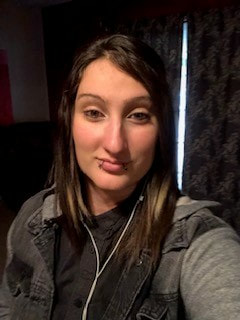 Leslie Khattarchebli has been in Bakersfield for 9 years. She's originally from Glendale, California and passionately loves coffee. Pivotal points. We all have quite a few in our lifetime. I personally had a few over the last year alone. But if I’m asked to pick the “one” most significant pivotal point in my 52 years of life, that's easy. It was September 7, 2018. What happened that day? I had the courage to walk into The Center for Sexuality and Gender Diversity. That’s all...I just walked in. I’m a 52 y/o cis-gender gay man. Today, I’m out and I’m proud. But it was not always that way. As many in my generation, we grew up not understanding who we are. I had little knowledge what a gay person was. As a child, I was odd and lonely - a nerd, I must add. The last thing I needed was something else to make me even more different. I wanted to be like the other boys, have popular friends, have a girlfriend, etc. Deep inside I knew who I was, but it was not too hard to suppress it, not to think about it. Then destiny put me in front of the woman that I would marry. We had a lot in common: we were looking for companionship, for love and to start a family. So after less than a month of dating, we got engaged and in about 8 months later, we were married. We had a really good life. And we had 2 amazing children - both in college now, both on a path for successful careers. I can’t complain about what we had. Life was good. And even now, I can definitely say I have no regrets in my choices. But there was a part of me that was not whole, not happy, not quite right. I dedicated my life to my kids; they were (and to a point, still are) my purpose. So when their time came to leave for college, the all too famous empty nest happened. And I found myself lacking something. It’s no coincidence that at that moment, I became honest with myself. Yep, I am gay. But I thought: I have a great life. My wife is a great person that does not deserve the pain I would cause her. Still, I had to tell someone. And I did. My daughter that is my “buddy “ was the first, then I told others. I was naive enough to think that if I just told a few close people, that would be enough and then I could go back to my closet. By the way, every person I told has been nothing but supportive and loving, so I’m blessed. But even their love and support, it turned out, was not enough. I realized once I came out to some, something inside of me started screaming that I needed to be me, I needed to be authentic. So I decided to contact The Center, and got an amazing and supportive response immediately. Then I decided, on September 7, to walk in. I remember telling the volunteer that I first met that I did not know what I was doing there. I really didn’t. I think this was my way of openly expressing myself, who I was, to a group of people, all strangers. And I was a little nervous. But that day I felt comfortable and very supported by the really cool people gathering there. Something I was not expecting. I knew I belonged (yes, I am quoting the website). But I still thought I could never be able to fully come out. I could not fathom how I could do that. I had a great life, great kids and a really good relationship with my wife. She is a wonderful human being and a friend. And the rest of my family and friends - how could I tell them? But with the support from The Center, the network of new friends I made (by the way, fantastic people) and the counseling I received through The Center itself, I worked things out and I figured out my life. And then, I was ready. On Martin Luther King Jr. Day, January 21, 2019, I had another pivotal point. That day I fully came out, no more hiding, no more pretending. I started calling and texting people close to me. It was still a very emotional time for me. I was leaving my old life, not an authentic one - but still, the person I portrayed to the world, the one I was used to being, my safety net, was just gone. But at the end of the day, I was me, I was happy, and I was whole. A big weight was all gone. Yet I know, the road ahead will still be hard and painful at times. I am still working out things in my personal life. And that part has to stay private and personal. But the love and support I have received has been amazing. I am so grateful and I am dedicated to The Center, their ideals and mission. I am trying to be an active part of the LGBTQ community and to do whatever is in my power to help, to advocate. I found my new purpose, here in Bakersfield. My old life feels so far away, even if my journey is new. I am still me but now I am the whole, real me. And, as others I am sure can relate, it is an amazing feeling. My life has changed. And I owe it mostly to this place with the colorful flags in front, right here on 18th Street. I have a debt to The Center that I plan to pay forward by service to our Community. My life has reached a pivotal point, and will never be the same. And for that I am forever grateful. about the author: Jaime L. Ortiz 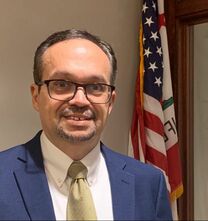 Jaime L. Ortiz was born and raised in Puerto Rico. After finishing medical school on the Island, he moved for training to Canton, Ohio and then to New York City. As a practicing psychiatrist, he worked with children and adults, in mostly indigent city and rural areas. He practiced for a few years in West Virginia and finally in Bakersfield for about 15 years, where he currently is working for the Department of Corrections and Rehabilitation. I was fortunate to attend the “Mad River and the History of LGBTQ Teachers' Rights” presentation by Dr. Margaret A. Nash from UC Riverside held at CSUB on March 21st. While I admit that I was pretty naïve to this topic, I was eager to learn - especially since my wife is both a teacher and part of the LGBTQ community. Dr. Nash begins by detailing an unjust case in 1974 about a guidance counsellor, Marj Rowland, from Mad River, Ohio, who fought for her civil rights against discrimination based on her sexual orientation. This story really stood out because it is significant to note that while she won her initial case against discrimination, she was faced with backlash in the form of retaliation by the school district. The backlash Rowland endured was unwarranted, and it included: no student contact, denial of her employment contract renewal, being blacklisted within different schools in Ohio and even being charged with felonies and misdemeanours. The most gruelling part was that Rowland’s series of legal battles totalled over a decade long, as there was no sense of urgency for her case, since sexual orientation was not yet constitutionally protected. Even though Rowland’s resilience throughout the fight for her rights is commendable and inspiring, it is hard to ignore how blatant her freedom of speech and civil rights were unacceptably violated. Although there are currently Equality Acts in place to serve and protect LGBTQ individuals in the workforce, it still makes one wonder how far along we truly are today in comparison to Rowland’s case. While the anti-discrimination laws that presently exist for LGBTQ teachers are vital, there still seems to be a lingering fear for teachers to openly come out in public. So the question remains: how do we continue to help protect teachers and students alike, to avoid the backlash and mental agony of what Rowland had to endure? Current and future educators who were in attendance suggested that it starts with creating a safe and inclusive environment in schools. Not only do we need to vocalize the intolerance of discriminatory behaviours, but we must also show our support tangibly. We can show support by putting up rainbow stickers in classrooms, making positive affirmation posters, celebrating LGBTQ milestones like National Coming Out day, and creating school clubs that promote love and support for everyone inclusively - just to name a few examples. These practices should be implemented habitually, in hope that safe environments eventually become a social norm for the well-being of our future generations. If you or someone you know need assistance with creating a safe environment in schools or in other workplaces, there are plenty of resources available. CSUB and BC have continually improved their school climates by providing visible support for all LGBTQ faculty and students. The Center of Sexuality & Diversity itself has been created as a safe haven for the LGBTQ community and it offers multiple support groups and services. Moreover, the Center actively provides a range of resources to local business allies in order to promote workplace equality. Specifically, abOUT Kern was formed to strengthen our community by hosting professional networking events for LGBTQ people and their allies. To increase awareness of LGBTQ issues in the workplace, Chevron and The Center have teamed up for an evening of networking and to share best practices around LGBTA (the A here is for "ally") workplace equality and community. This free event is for Kern County professionals and members of the business community. The next abOUT Kern event will take place on Thursday April 4th at 5pm – 7pm, located at CSUB's Stockdale room. For more information, please contact the Center at info@thecenterbak.org or refer to the Center’s Calendar. about the authorR. Velasco is a Canadian writer new to Bakersfield. She is actively seeking ways to raise community consciousness about LGBTQ issues and topics, one blog post at a time. She is also part of The Center’s Women Support Group.
The Center for Sexuality & Gender Diversity (The Center) is pleased to release its first annual Impact Statement of services provided to the community. “The Center provides services to support Kern County LGBTQ+ residents in living happy, productive, fulfilling lives in a safe and supportive community,” said Executive Director Jan Hefner. “Our efforts are focused on individual support services such as counseling and activities to help build self-esteem, and community transformation activities including cultural competency trainings. By conservative estimates, 43,000 Kern residents identify as LGBTQ+; many have struggled for self-acceptance as well as acceptance and understanding from family, friends, and community. The Center provides that acceptance and educates the wider community in how to provide affirming services.” The highlights in the Impact Statement include 552 private counseling sessions provided and 819 persons receiving Cultural Competency Trainings during the year. Trainings were provided to a variety of organizations and businesses, including the Bakersfield Police Department, Kern County Network for Children, Bakersfield Homeless Center, Kern Behavioral Health & Recovery Services, and more. In mid-November, The Center also launched direct services in ten Kern communities outside of Bakersfield, including Ridgecrest, Kern River Valley, and Taft. “If a picture is worth a thousand words, so is a quantifier of community impact,” adds Board President Louis Medina. “The Center’s Community Impact Sheet for 2018 features many such quantifiers that hopefully will paint a picture of the BIG impact The Center made in the lives of many people in the local LGBTQ+ community and its allies last year, as well as among our nonprofit partners who are now more culturally competent on LGBTQ+ issues and needs. This data excites us because thanks to staff growth and increased board and volunteer engagement, we are hopeful that The Center's community impact will just continue to go from strength to strength." Comments received across programs affirm that The Center’s services are improving client lives:
The Center’s programs and services receive major funding from California Reducing Disparities Project, The California Endowment, Kaiser Permanente Kern County and other funders, as well as corporate and personal donations. For more information on receiving services or supporting The Center’s work, call 661-404-5209. Media Contact:
Executive Director Jan Hefner talks about her personal journey that brought her to be a member of The Center’s core leadership: acting, theater, advertising, AIDs activism and community health work. Born and raised in Bakersfield, Hefner gives us a glimpse into what she finds challenging and rewarding about working as an LGBTQ advocate here in Kern County. *** Do you face specific challenges as a member of the LGBTQ community in this particular area, the Central Valley? It's interesting. I was born here, and except for the two years I lived in LA, I've lived here all of my life. I've never felt the need to flee Bakersfield as a place, but I acknowledge there are a lot of people who really have struggled being here. I'm not sure why I never felt the need to flee, but really attribute it a lot to the community I found through theater because there were a lot of LGBTQ people in theater. Were you out in your daily life? I had not considered myself closeted, but I also didn't talk about "those things that we're not supposed to talk about." And I was partnered during almost all of my time when I worked at the newspaper, and I talked about my partners but not in a partner kind of way. You know, roommates or friends or whatever. But there were several people that I became friends with, and of course they knew, and we talked about it openly. When I got involved in the Center, before I was hired here, I was a spokesperson for the news, because of my marketing background. I distinctly remember standing on the corner outside my office over on the corner behind the hospital, with the news crew who wanted to shoot it outside because of the light. I was doing something about transgender rights. I'd done lots of TV, I'd done commercials and all that. But I remember my stomach just flopping over, because it was the first time that I was going to be on TV advocating for the LGBTQ community. And it just made me incredibly nervous. But it's like anything else, because you go through and you think, "OK, that was okay, nothing broke" - and then you do it some more. And now we're doing these TV spots that are out there, and it's going to be interesting to see what kind of response there is to those. [Click "Read More" below to read the full interview with Jan Hefner.] By Jose M Granados Public opinion and support for LGBTQ rights have tipped to the positive side, even in Bakersfield and Kern County. The latest surveys and polls show that nearly half of Americans and 64% of those who identify as LGBT allies say they are more likely to spend money with businesses that are LGBT inclusive – see “Being LGBT Inclusive Is Good for Business, Survey Finds” on Fortune.com and “Why Many Businesses Are Becoming More Vocal In Support of LGBTQ Rights” on hbr.org. Clearly, welcoming all customers, including LGBTQ and their allies, can have a wide range of economic impacts for your business, the city and the community - from recruiting educated and talented employees to the ability for the city to attract corporate investment, tourism, conventions and major events. In a 2016 poll, nearly 50% of American meeting planners said they would avoid planning events in places that pass anti-LGBTQ legislation. Since then, several business coalitions have popped up around the nation making the economic case for nondiscrimination, inclusion and diversity. As the general support for LGBTQ grows, so does the economic incentives for companies to position themselves in sync with that growing sentiment. Embracing inclusion and diversity is not just ethically and morally right, it is also good for business. Being LGBTQ-friendly makes your company more profitable. Is your company ready to create an inclusive environment for your team and customers? Is your business ready to tap the growing LGBTQ market? If you are, great! If you are not, help is here. Reach out to The Center for Sexually & Gender Diversity and they will walk you through the process of how to become an LGBTQ friendly business and how to tap into the growing LGBTQ market segments. Either way, you should attend the next abOUT Kern business mixer, a professional networking event for LGBTQ+ people and allies. The event is Thursday, April 4, 2019 5pm – 7pm, at California State University, Bakersfield, Stockdale Room, 9001 Stockdale Hwy, Bakersfield, CA 93311 – download the flyer below for details. The event is free and open to everyone. Note: LGBTQ stands for Lesbian, Gay, bisexual, Transgender and Queer/Questioning
Jose M Granadosis a longtime member of the Bakersfield community and a member of the Board of Directors at The Center for Sexually & Gender Diversity. He can be reached at info@thecenterbak.org. As you know, sexual orientation and gender identity are not asked in many national surveys – including the Census – which can make it difficult to advocate for the resources that our communities need to thrive. Our programs and advocacy work is stronger when we are all counted.
That’s why we’re excited to share the #Out4MentalHealth Community Survey with you. This survey is designed to capture the lived experiences of diverse LGBTQ Californians, and the factors affecting our health and wellbeing. The results of the #Out4MentalHealth Community Survey will better direct statewide and local advocacy efforts for programs, resources, and policy changes that will meet the needs of our communities. Please take the time to take the survey and share with others who would be interested. Our social media toolkit provides sample graphics, Facebook, and Twitter posts, as well as a sample email and flyer you can display at your work or anywhere LGBTQ people gather locally. Everyone ages 18 and up who completes the survey will have a chance to win a gift card worth up to $50. The first 500 youth ages 17 or under to take the survey can claim a $5 gift card. Share your experiences and make sure your voice is counted in the #Out4MentalHealth Community Survey! |
|||||||||||||
The Center for Sexuality & Gender Diversity (The Center) is a Community-Based Organization and 501(c)(3) nonprofit organization serving the 2SLGBTQIA+ community in Kern County.
Receive Monthly UpdatesWe have so many exciting things going on, be the first to find out!
|
Helpful Links |
Get Involved |
Contact Us |
Certified as Financially Sound and TransparentEIN: 45-3709449
|
|
© The Center for Sexuality & Gender Diversity 2018
|
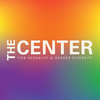


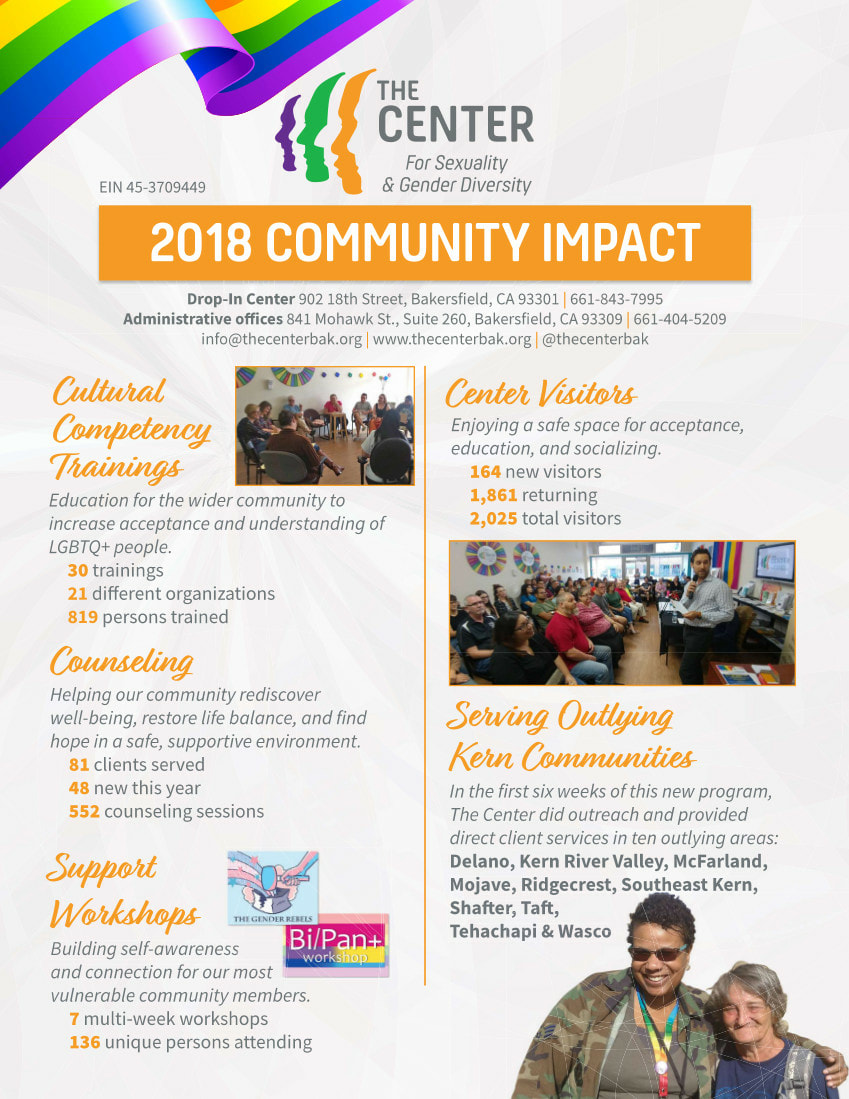
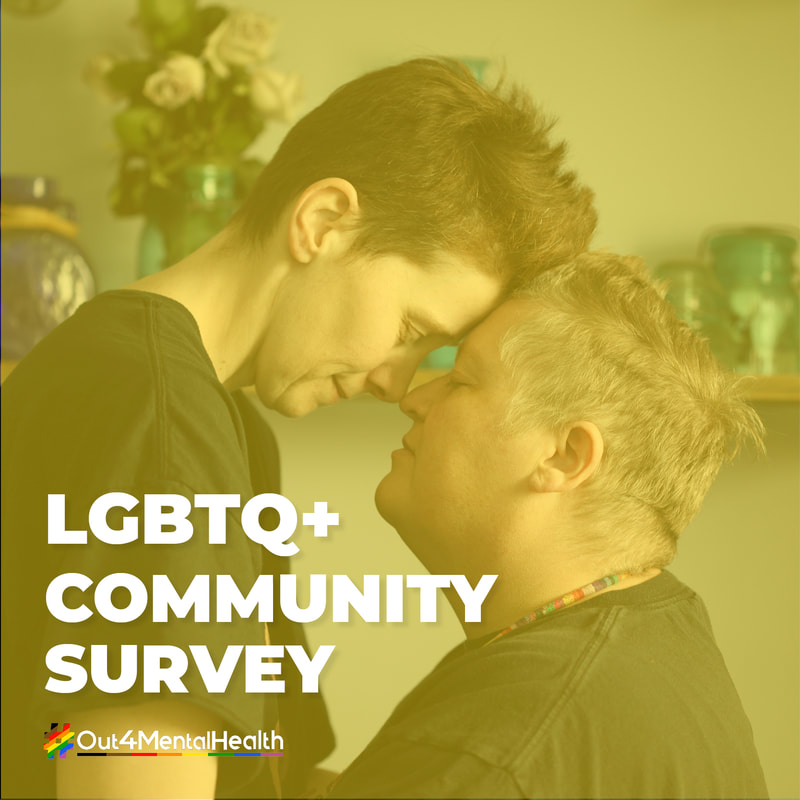
 RSS Feed
RSS Feed


